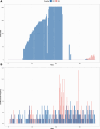Evaluating the risk of conflict on recent Ebola outbreaks in Guinea and the Democratic Republic of the Congo
- PMID: 38509557
- PMCID: PMC10953285
- DOI: 10.1186/s12889-024-18300-8
Evaluating the risk of conflict on recent Ebola outbreaks in Guinea and the Democratic Republic of the Congo
Abstract
Background: Reducing Ebola virus transmission relies on the ability to identify cases and limit contact with infected bodily fluids through biosecurity, safe sex practices, safe burial and vaccination. Armed conflicts can complicate outbreak detection and interventions due to widespread disruption to governments and populations. Guinea and the Democratic Republic of the Congo (DRC) have historically reported the largest and the most recent Ebola virus outbreaks. Understanding if conflict played a role in these outbreaks may help in identifying key risks factors to improve disease control.
Methods: We used data from a range of publicly available data sources for both Ebola virus cases and conflict events from 2018 to 2021 in Guinea and the DRC. We fitted these data to conditional logistic regression models using the Self-Controlled Case Series methodology to evaluate the magnitude in which conflict increased the risk of reported Ebola virus cases in terms of incidence rate ratio. We re-ran the analysis sub-nationally, by conflict sub-event type and tested any lagged effects.
Results: Conflict was significantly associated with an increased risk of reported Ebola virus cases in both the DRC and Guinea in recent outbreaks. The effect was of a similar magnitude at 1.88- and 1.98-times increased risk for the DRC and Guinea, respectively. The greatest effects (often higher than the national values) were found in many conflict prone areas and during protest/riot-related conflict events. Conflict was influential in terms of Ebola virus risk from 1 week following the event and remained important by 10 weeks.
Conclusion: Extra vigilance is needed following protests and riot-related conflict events in terms of Ebola virus transmission. These events are highly disruptive, in terms of access to transportation and healthcare and are often in urban areas with high population densities. Additional public health messaging around these types of conflict events, relating to the risks and clinical symptoms may be helpful in reducing transmission. Future work should aim to further understand and quantify conflict severity and intensity, to evaluate dose-response relationships in terms of disease risk.
Keywords: Conflict; Democratic Republic of the Congo; Ebola virus; Guinea; Outbreaks.
© 2024. The Author(s).
Conflict of interest statement
The authors declare no competing interests.
Figures





Similar articles
-
Projections of epidemic transmission and estimation of vaccination impact during an ongoing Ebola virus disease outbreak in Northeastern Democratic Republic of Congo, as of Feb. 25, 2019.PLoS Negl Trop Dis. 2019 Aug 5;13(8):e0007512. doi: 10.1371/journal.pntd.0007512. eCollection 2019 Aug. PLoS Negl Trop Dis. 2019. PMID: 31381606 Free PMC article.
-
Dynamics of conflict during the Ebola outbreak in the Democratic Republic of the Congo 2018-2019.BMC Med. 2020 Apr 27;18(1):113. doi: 10.1186/s12916-020-01574-1. BMC Med. 2020. PMID: 32336281 Free PMC article.
-
Outbreak of Ebola virus disease in the Democratic Republic of the Congo, April-May, 2018: an epidemiological study.Lancet. 2018 Jul 21;392(10143):213-221. doi: 10.1016/S0140-6736(18)31387-4. Epub 2018 Jun 29. Lancet. 2018. PMID: 30047375
-
Impact of Ebola epidemics on the daily operation of existing systems in Eastern Democratic Republic of the Congo: a brief review.J Med Econ. 2024 Jan-Dec;27(1):184-192. doi: 10.1080/13696998.2024.2305009. Epub 2024 Jan 22. J Med Econ. 2024. PMID: 38240249 Review.
-
Indirect Effects of Ebola Virus Disease Epidemics on Health Systems in the Democratic Republic of the Congo, Guinea, Sierra Leone and Liberia: A Scoping Review Supplemented with Expert Interviews.Int J Environ Res Public Health. 2022 Oct 12;19(20):13113. doi: 10.3390/ijerph192013113. Int J Environ Res Public Health. 2022. PMID: 36293703 Free PMC article.
References
-
- World Health Organization. Ebola virus disease. https://www.who.int/news-room/fact-sheets/detail/ebola-virus-disease (2021).
Publication types
MeSH terms
Grants and funding
LinkOut - more resources
Full Text Sources
Medical
Miscellaneous

